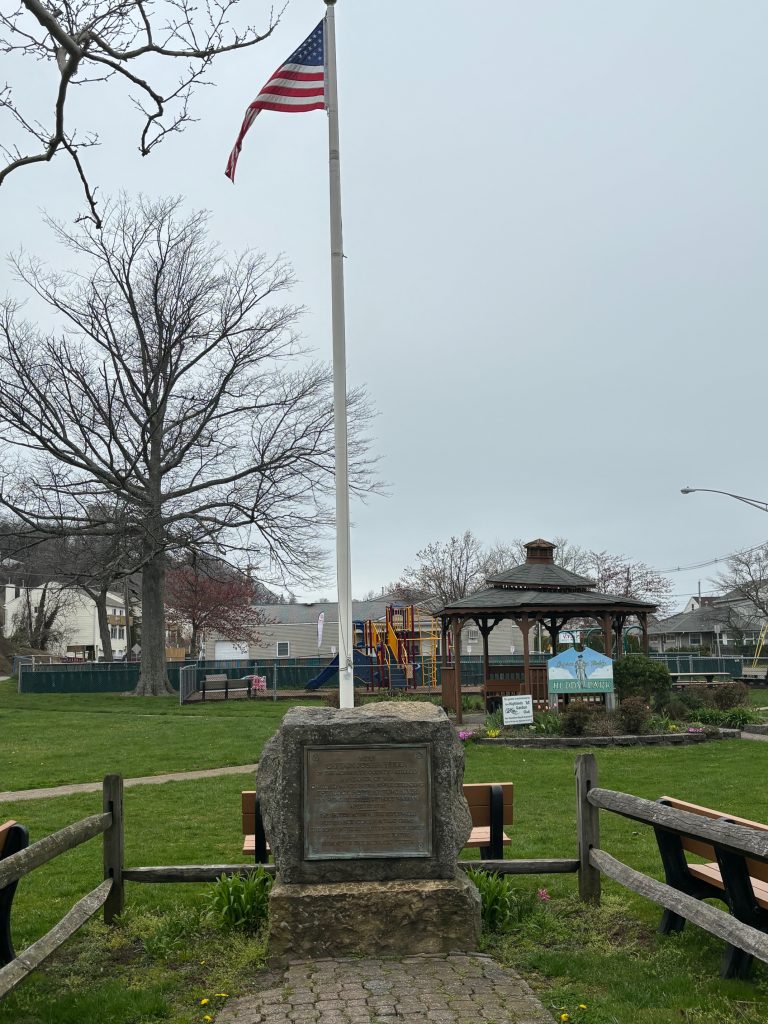By JF Grodeska

On July 4, 2026, the United States will celebrate the 250th anniversary of the signing of the Declaration of Independence. It has been said that “To go forward, we must learn from our past.” The truth is that to go forward, we must learn our past – not only the survey courses taught in history class but also our local past, the past that defines us and where we live.
Huddy Park at 70 Waterwitch Ave. in Highlands holds a piece of that history – a stone memorial to its namesake, Revolutionary War hero Capt. Joshua Huddy.
Though named Joshua, everyone called him Jack, and he was larger than life. He drank too much, was of surly demeanor, and had an eye for larceny. During the Revolution, Huddy led a militia, was a privateer with his own gunship, and escaped death and capture so many times people thought he had nine lives like a cat.
It was April 12, 1782. The Revolutionary War had effectively ended in October at the battle of Yorktown, when defeated British LG Charles Cornwallis surrendered to U.S. Gen. George Washington. At Gravelly Point in Highlands, Loyalist Capt. Richard Lippincott sat watching Huddy, his neighbor, writing his last will and testament on a barrel head. Directly above Huddy, draped over a tree limb, was a noose.
As Lippincott watched, he must have been struck by the man’s appearance. He was eerily calm, sitting beneath that noose.
Earlier that day, Lippincott and his band of Loyalists, under the orders of William Franklin – president of the Board of Associated Loyalists, the last Royal Governor of New Jersey and Benjamin Franklin’s son – proceeded to the British warship Britannia, anchored at Horseshoe Cove on Sandy Hook and demanded its captain hand over Huddy and two other Patriots, Daniel Randolph and Jacob Fleming, in a prisoner exchange.
This was a ruse. Lippincott knew Huddy was to be executed in retaliation for the death of wealthy Freehold Loyalist farmer Philip White. In truth, while White was indeed a farmer by vocation, he enlisted in the British Army and received his commission on March 27, 1777. He was in command of the schooner Hero’s Revenge of which he and Daniel Sickels were principal owners. White also held a commission as prize master of the schooner Wasp when it was stationed in the vicinity of New York. He was killed March 30, 1782, while attempting to escape a Patriot force supposedly led by Huddy. However, Huddy had been captured March 24, 1782, by British forces at the Battle of the Block House (Toms River).
Huddy, Fleming and Randolph were ironed and hustled into a longboat manned by 16 Loyalists and Lippincott and ferried across Sandy Hook Bay to Gravelly Point.
When Huddy finished writing his will, he handed it to one of the Loyalists who promised to bring it to Freehold for probate. Huddy strode over to Lippincott and, remarkably, shook his hand. According to witnesses, Huddy climbed up onto the barrel on his own. The noose was placed around his neck. Looking at Lippincott, Huddy proclaimed his innocence in White’s death. “I shall die innocent and in a good cause,” Huddy said.
And with a mighty heave, Jack Huddy, Patriot hero, was hoisted into the air and slowly strangled to death.
The next day, Patriots found his body hanging from the tree with a note pinned to his corpse:
“We, the refugees, having long held with grief the cruel murders of our brethren, and finding nothing but such measures daily carrying into execution; we therefore determine not to suffer without taking vengeance for the numerous cruelties, and thus begin, having made use of Captain Huddy as the first object to present to your view, and determine to hang man for man while there is a refugee existing. UP GOES HUDDY FOR PHIL. WHITE.”
More than 400 people attended Joshua Huddy’s funeral and burial at Old Tennent in Freehold. They paid their respects to the hero, but they were also there to protest his murder at the hands of the Tories (Loyalists).
On April 14, 1782, Washington received a letter from the citizens of Monmouth County describing Huddy’s murder. They demanded action or they would seek revenge on their own. Washington and his superior officers unanimously decided that a British officer of equal rank had to be hanged in retribution for Huddy’s death.
In a letter to the commander of Lancaster Prison Camp, Gen. Moses Hazen, Washington ordered that a prisoner – a captain in the British Army – be chosen and hanged in retaliation for Huddy’s murder. Hazen left the matter to chance, requiring 13 prisoners to draw lots from a hat. Capt. Charles Asgill, a 19-year-old heir to a fortune in England, drew the one that read “Unfortunate.”
Washington had second thoughts and was concerned about how Asgill’s hanging would be interpreted. He tasked Congress with the responsibility of determining Asgill’s fate. Meanwhile, the young captain’s mother, Lady Theresa Pratviel Asgill, began a formidable letter-writing campaign on behalf of her son. One of the recipients was the French foreign minister, Charles Gravier, count de Vergennes, who intervened on behalf of Asgill. Congress, after much deliberation, freed the British captain.
The Asgill Affair, as it became known, nearly crippled the tenuous peace between the United States and Britain. Charles Asgill went on to become a prominent general in the British Army. Richard Lippincott was granted an estate in Canada by the British Crown and was never punished for the murder of Joshua Huddy.
The article originally appeared in the April 11 – April 17, 2024 print edition of The Two River Times.














